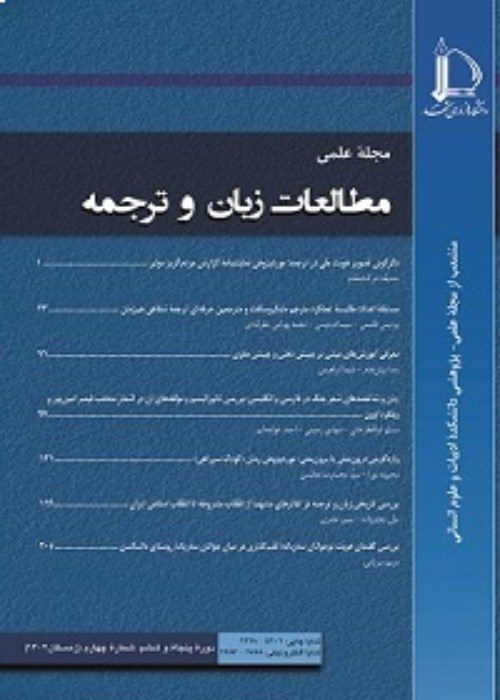An Investigation into Cultural Translation in Master's Program of Translation Studies at Iranian Universities: Shortcomings and Necessities in regard to Student's Views and Performance
Author(s):
Abstract:
According to the official master’s curriculum of Translation Studies, one of the main goals of the program is to educate translators to fulfill the growing need of exchanging information with other countries. To this end, knowledge of cultural elements is one of the basic essentials. Besides linguistic features of the source and target languages, translators are supposed to be familiar with cultural features of both languages and how to render cultural elements. This paper seeks to examine whether the official curriculum of Translation Studies at MA level adequately concerns the role of culture in translation and translating. In addition, students’ viewpoints about the curriculum and their performance in translating cultural elements and idioms are explored. A content analysis of the official curriculum standards indicated that only two elective courses of "cultural elements in two languages" and "culture and sociology in translation" are offered in order to acquaint students with cultural elements. However, only two from among ten universities enquired offered one of the courses as an elective course. A total of 60 graduate students of Translation Studies took part in this study. They were divided into experimental and control groups including the students who took either of the courses and those who did not, respectively. They were administered a researcher-made qualitative questionnaire tapping into their views about cultural foci in their translation courses. The results of this phase of study revealed that cultural elements and their translation were not adequately addressed in the curriculum. The students, then, in the second phase of the study, took a translation test in an attempt to assess and compare their ability of translating cultural elements. A use was made of t-test to compare the performance of the two groups. The results indicated that the experimental group outperformed the control group significantly in translating cultural elements. This suggested that sufficient attention to culture, cultural elements, and how to translate them significantly affects translation quality. In conclusion, some recommendations are made to improve the quality of cultural translation.
Keywords:
Language:
Persian
Published:
Language and Translation Studies, Volume:45 Issue: 3, 2013
Pages:
45 to 63
magiran.com/p1246061
دانلود و مطالعه متن این مقاله با یکی از روشهای زیر امکان پذیر است:
اشتراک شخصی
با عضویت و پرداخت آنلاین حق اشتراک یکساله به مبلغ 1,390,000ريال میتوانید 70 عنوان مطلب دانلود کنید!
اشتراک سازمانی
به کتابخانه دانشگاه یا محل کار خود پیشنهاد کنید تا اشتراک سازمانی این پایگاه را برای دسترسی نامحدود همه کاربران به متن مطالب تهیه نمایند!
توجه!
- حق عضویت دریافتی صرف حمایت از نشریات عضو و نگهداری، تکمیل و توسعه مگیران میشود.
- پرداخت حق اشتراک و دانلود مقالات اجازه بازنشر آن در سایر رسانههای چاپی و دیجیتال را به کاربر نمیدهد.
In order to view content subscription is required
Personal subscription
Subscribe magiran.com for 70 € euros via PayPal and download 70 articles during a year.
Organization subscription
Please contact us to subscribe your university or library for unlimited access!


